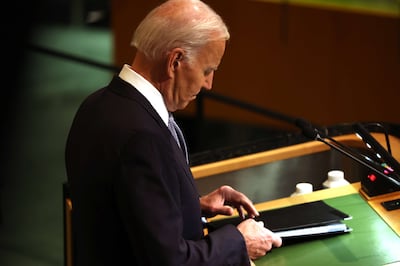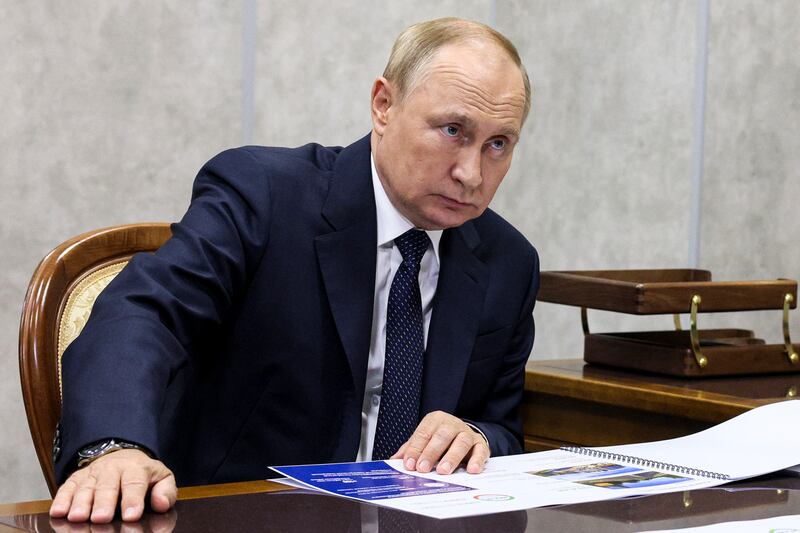The war in Ukraine has entered a decisive phase, with Russian President Vladimir Putin ordering referendums in the Donbas last week. The outcome of these referendums, which the West believes Moscow has designed with the purpose of annexing Ukraine’s Russian-controlled regions, will change the rules of the conflict. At the same time, Mr Putin has invoked his government’s nuclear options and declared a partial mobilisation of up to 300,000 conscripts, indicating the expansion of the war in the coming weeks.
It is now clear to anyone who previously thought Mr Putin might take steps to negotiate with Kyiv or back down that he is convinced he can – and is determined to – prevail in Ukraine and will not entertain the idea of a defeat. The Kremlin is not afraid of inviting a western military intervention and has put Nato on edge by talking about victory at any cost, including a nuclear cost.
On the other hand, it is clear that American and European leaders have made their decision in the equation of victory-or-defeat and will not allow Russia to seize Ukraine, no matter the cost. This means that, what appeared impossible a month or two ago is now in the realm of plausibility, meaning direct western intervention in the war, in the event of Russia deploying tactical nukes – which are not strictly "tactical" or "small radius" weapons.
So who will win and who will lose in Ukraine?
First, let’s address the big picture – the US strategy that many believe is to implicate the Russian leadership and its system, if not Russia itself, for calculations related to Washington’s grand strategy vis-a-vis China’s rise. It must be said that no matter the planners’ genius, it requires the target to fall into the trap. Indeed, Moscow did not resist this trap. It even doubled down. Its leadership thought its ultimatums and escalations would force the West to back down and comply with its demands, and therefore, enable a Russian victory in Ukraine. So far, it has lost its bets and continues to follow the path charted for it by the western powers towards an ambush that could prove disastrous for Russia.

Comparisons have been made between Moscow’s intervention in Afghanistan, which eventually led to the break-up of the Soviet Union, and the Ukraine war that could have dire consequences for the Russian Federation. Backing down now could amount to a significant setback for Moscow. Yet, the paradox is that continuing this war carries the same risks, particularly if Russia loses. For this reason, defeat is not a word in its dictionary and not an option for its military, especially after the war exposed the latter’s weaknesses and undermined its prestige.
From Washington's point of view, defeating Russia helps the American strategy against China. US National Security Council strategists believe that defeating Russia would cause Beijing to lose a strategic partner practically and psychologically. It also means, according to one informed expert, that China would lose its Russian "buffer zone", forcing it to the frontline in its strategic stand-off with the US.
Of course, some experts challenge the logic of defeating Russia for the sake of altering America's strategic equation with China. Some also underscore the risks in Nato’s strategy if the Ukraine war escalates to the nuclear threshold and culminates in a Russian victory. First, reaching the nuclear threshold, whether through tactical nukes or nuclear-capable Iskander missiles, could open the proverbial Pandora’s box. Second, there is a concern that Russia could expand the scope of the war, depending on how it pans out, by acting against Poland and the Baltic states.
Russia will not allow Ukraine to be shared by the two sides. But nor will Ukrainian President Volodymyr Zelenskyy back down. He sees Moscow’s failure to remove him from power as a decisive moment in the war. He is also confident that Nato will guarantee Kyiv the military edge. Modern warfare is not limited to what goes on in the battlefield; it’s also a technological war, and Mr Zelenskyy is using Nato’s advanced technology to fight Moscow.
Nato could be forced to intervene directly, for example to protect Ukraine’s nuclear reactors, if Mr Zelenskyy requests it. Ukraine is home to 14 reactors in addition to the Russian-controlled Zaporizhzhia plant in the south-east. In such a scenario, the war would become a European war. The US, also to help protect the nuclear reactors, might be willing to supply missiles to Ukraine with a range of up to 400 kilometres, long enough to reach Crimea and perhaps even the Russian capital. In which case, according to a Russian expert, Moscow could deploy nuclear weapons.
The Kremlin is seen to be paving the way towards being able to use these weapons. The referendums in the Donbas, to conclude on Tuesday with the Russian expectation that majorities will vote in favour of joining its federation, will be followed by the annexation of those regions. Subsequently, from September 29-30, after the Russian Duma endorses the results, any assault on those regions would amount to an assault on Russia, giving the Kremlin the right to respond by all means necessary, included nuclear ones.
Put differently, according to another expert, “the buffer zone between Russia and Ukraine will disappear, and the war will enter a new threshold that includes the activation of Russian strategic nuclear instruments based on national laws to defend Russian territories using all available means”.
A Russian military victory, if it were to transpire, may require an escalation that would bring with it much destruction. For this reason, the next two weeks will not only be crucial, but possibly also dangerous.





